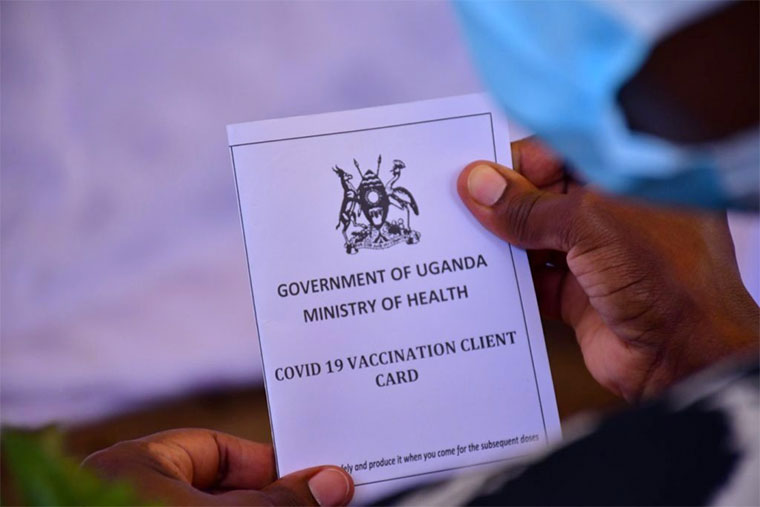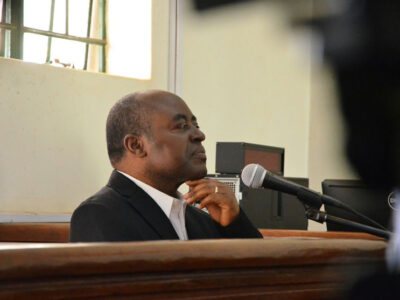Health rights activists have blasted the Uganda Human Rights Commission (UHRC) for infringing on the right of Ugandans to reject COVID-19 vaccination.
It comes a day after UHRC chairperson, Mariam Wangadya, said that Ugandans have no right to reject the ongoing COVID-19 vaccination exercise during a press conference ahead of the annual International Human Rights Day on December 10, 2021.
Health activists sy Wangadya’s statement has no basis in the law and that any effort to promote vaccination should follow proper laws locally and internationally. Moses Mulumba, the head of the Center for Health, Human Rights and Development (CEHURD), says that UHRC ought to understand that they can only operate within the law.
He referred to the Immunization Act 2017, which gives the minister of Health powers to issue a statutory instrument to provide for vaccination in extraordinary cases. The minister can also determine if the vaccination is mandatory or not.
Mulumba says since the minister has not issued such an instrument, it is incorrect for UHRC to say that Ugandans cannot reject vaccination.
“The Uganda Human Rights Commission needs to understand that they have to work within the law. At the moment, the minister has not made any law on vaccinations. It is therefore going to be very difficult to know the national mandate on vaccinations, each country has approached it differently but whatever the approach the vaccination mandate has to be within the acceptable standards of human rights framework but also within public health rights. So the Human Rights Commission cannot talk when there is no law and without that it is difficult. Even when the law has been made and that law is contrary to the international standards…it will still be challenged,” said Mulumba.
Although the commission is mandated to guide the government on human rights issues, Mulumba says that if the government followed them on that, they would risk being sued by Ugandans forced to take the vaccine without following the law.
“People will sue them, you know individual autonomy is important even when you make public health interpretation must be within a standard. That standard has been provided within the international human rights standards…There are circumstances where you make a national law and say these rights are going to be limited but those limitations of rights have to be documented within the law. If we don’t have that law, then we can’t talk about mandates that are not figuratively grounded. So they will sue them, even the people who are employing and are forcing people to be vaccinated without the national standards, they will sue them because there is no legal backing,” Mulumba added.
Mable Kukunda from the Uganda National Health Consumers’/Users’ Organization also says that UHRC is wrong to say that Ugandans cannot reject vaccination. She says Uganda should only enforce existing laws and in the event that there is no law making it mandatory to take COVID-19 jab, people’s rights should be respected.
Kukunda says that consent is important especially since many of the vaccines on market are still in trial stages, adding that is partly why the World Health Organization guides that people consent to vaccination by filling consent forms.
“As health consumers, our knowledge is that the COVID-19 vaccinations are still under trial and that is why the World Health Organisation asks or recommends that people make consent before they are vaccinated. So I think it might not be right for people to be forced to get vaccination because at least from the procedures and protocols by WHO these are not yet at the level or position for mandatory vaccination like we see for others like for polio and others,” Kukunda said.
Kukunda says that the government should have an instrument in place if they are to make COVID-19 vaccination mandatory. However, most important, Kukunda wants the government to enhance sensitization efforts to have the public embrace vaccination.
She says there are various anti-vaccination campaigns marred with myths that discourage people from taking the COVID-19 jab. There are myths in the public domain that vaccination is a depopulation campaign by the whites. Kukunda says the public should be educated on the importance of taking the jab to counter the falsehoods disseminated by anti-vaxxers.
Kukunda says that the government should also address issues of side effects. She called for a study into how people react when they take the jab. Last week, the Health minister, Jane Ruth Aceng told a committee of parliament that the ministry was working on an instrument to make COVID-19 vaccination and some other measures to curb the virus mandatory.
**********************
URN












